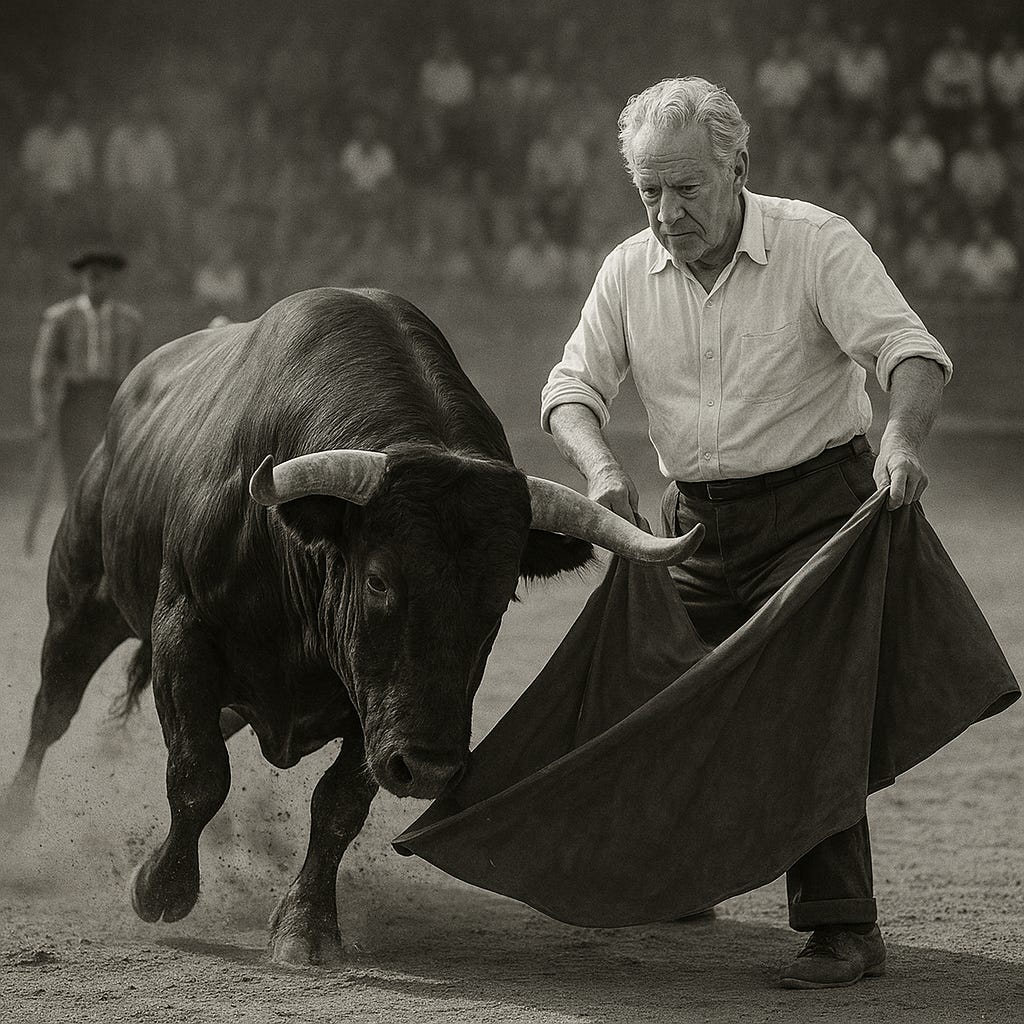Who Fights The Bull?
A speculative literary investigation
There’s a famous poem attributed to the matador Domingo Ortega, recited by folks like President John F. Kennedy and President Ronald Reagan, that goes like this:
Bullfight critics ranked in rows
Crowd the enormous Plaza full;
But only one is there who knows
And he’s the man who fights the bull.
I went looking for the original source of the poem, which is often cited to Sorensen’s Kennedy biography. Sorensen cites it as a poem by Ortega with a translation by Robert Graves, reprinted in Graves’s Oxford Addresses on Poetry (Cassell 1961).
Here’s the relevant passage, which is from Graves’s address upon election to the poetry chair at Oxford:
This Chair, the only elective one at Oxford, has been linked by statute with the School of English Language and literature—albeit of far older foundation. The occupant is therefore expected to make no pronouncement irreconcilable with the view of poetry that tutors and examiners require from undergraduates. It may thus be called a Siege Perilous: because Ben Jonson, of glorious memory, to whom the young wits of Oxford used to flock when in his old age he held forth at Great Tew, allowed poets alone the faculty of judging poems; and few English School tutors have been practising poets. . . . As Domingo Ortega, the veteran bullfighter, remarked the other day (the translation is mine):
Bullfight critics ranked in rows
Crowd the enormous Plaza full;
But only one is there who knows
And he’s the man who fights the bull.
I was satisfied to have found my source, and to cite it as something like: Poem by Domingo Ortega (translated by Robert Graves) reprinted in Robert Graves, Oxford Addresses on Poetry 4 (1962). (Online sources like poets.org also generally cite it as a Domingo Ortega poem.)
But then I started wondering. Do we really believe that this poem can be attributed to Domingo Ortega, or is Graves actually telling a story for dramatic effect, and he’s really the one who came up with the poem?
Isn’t it somewhat unlikely that a famous matador happened to “remark the other day,” in Spanish, something that could be faithfully rendered into beautiful rhyming couplets? On the other hand, isn’t it more likely that Graves might have needed to put his own poem into the mouth of a matador because, well, he’s the man who fights the bull. It doesn’t work if it’s just a poet who says it!
Fueled by this skepticism, I then dug around and found this Time Magazine story from February 1961 which describes the drama behind the vote for the Oxford poetry chair:
Last week, in solemn ritual, a record 658 berobed M.A.s padded into Oxford’s Sheldonian Theatre and presented ballots in Latin for the now hotly desired chair of professor artis poeticae. The winner: Robertum R. Graves, with 329 votes. Enid Starkie finished last with 96 votes, a bitter reminder that kingmakers never become kings. Hearing the news in Madrid, Winner Graves composed a victory communique in three minutes flat:
Experts ranked in serried rows
Fill the enormous plaza full
But only one is there who knows
And he’s the man who fights the bull.
This poem is just a few words away from the one Graves later attributed to Ortega, and it’s described here as something that “Graves composed . . . in three minutes flat.” No mention of the matador behind the curtain.
Obviously this remains quite speculative, but it seems likely to me that the poet who inspired a succession of American Presidents was actually the elected poetry chair at Oxford, not the man who fought the bull.



Follow up post coming next week.
A smooth almost innocent follow-up to Bedrock Con Law 101 underscoring the more overtly subversive Richard Primus ... That was another great episode!